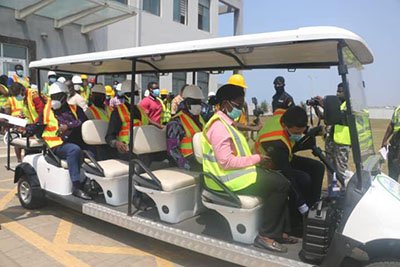Senior Minister, Mr Yaw Osafo Maafo has stated that government will support the Sewerage Systems Ghana Limited (SSGL), a subsidiary of Jospong Group of Companies Limited to undertake a number of sewage projects nationwide.
According to him, it was the responsibility of the government to provide support for sewage treatment to rid the environment of filth including solid waste.
The Senior Minister made the promise yesterday when he led a government delegation on a familiarisation tour of the Mudor Waste Water Treatment Plant and Lavender Hill Treatment Plant which were inaugurated four years ago, in Accra.
The two plants, being managed by Sewerage Systems Ghana Limited processes waste water and about 2,000 cubic metres of faecal matter daily in Accra.
Mr Osafo Maafo praised Mr Joseph Siaw Agyepong, the Chief Executive of Zoom Alliance Limited for his good works and said “we will provide you with financial support to make you viable and comfortable.”
He was conducted round by Mr Haidar Said, the Managing Director of Sewerage Systems Limited who told journalists that the company would soon begin work on water and faecal treatment project in Tema at an estimated cost of 76 million Euros.
Mr Said stated that similar projects would be undertaken in Kumasi, Sekondi-Takoradi and Tamale with the Kumasi faecal treatment plant set to be inaugurated in October this year.
The Sewerage Systems Ghana Limited boss singled out Mr Agyepong for praise and thanked the government for its continued support to the company.
Mr Said told the Senior Minister that the by-products of waste water and faecal matter were used for the manufacturing of compost fertilizer, charcoal for cooking and many other purposes.
He said more than 5,000 jobs were expected to be created upon the completion of all the projects.
Currently, Akosombo and and Tema are the two major towns in Ghana with a good sewerage system, but the one in Tema built in the 1960s to cater for 20,000 residents is not in good condition, and, therefore had to be rehabilitated.
Apart from Tema, all other beneficiary towns would have only faecal treatment plant in the meantime as efforts are being made by the company to address the issue of construction of pipes in communities not well demarcated.
BY MALIK SULLEMANA

